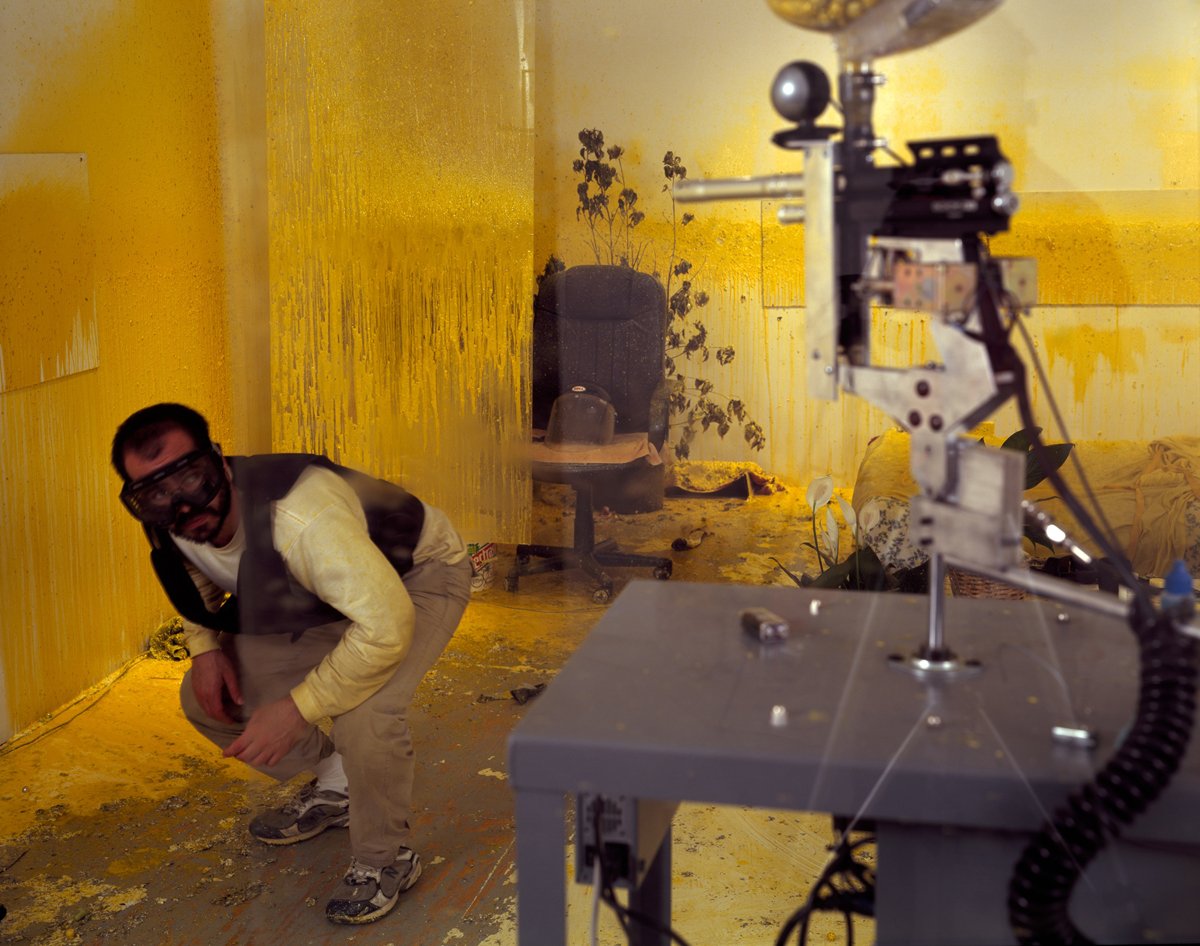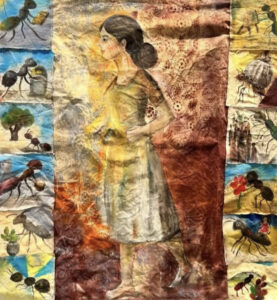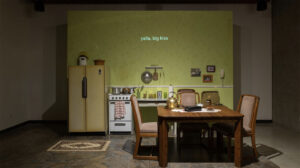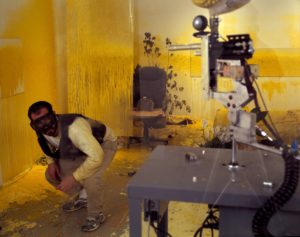Hisham Bustani
Translated from the Arabic by Alice Guthrie
The fugitive keeps moving from one place to another: his homeland is movement. The uneasy keeps constantly questioning: his homeland is doubt.
1 |
You have no place to retreat to the way defeated armies withdraw into the arms of their soldiers’ wives. Nothing casts sheltering shade over you like those archetypal shadow-of-a-man husbands in Egyptian soaps. You don’t even have the shade of a wall.
There is no one to lull you into believing that everything is as it should be, no respite in which to restock your anger resources ready for the next day, and no saying that the explosion detonated by the dregs of the night / your scoured-out stamina will be soothed by cold compresses soaked in blossom infusions.
And so you’ve discovered that you are in fact a homeless orphan, a stateless orphan. An uncertain orphan. Lost in the background of the picture, a blurry and cacophonous place. In the foreground are many things that have no real value to you, that mar your transition into a state of full sensory deprivation: walled into white, shrouded in silence. Will my alarm go off now? Will the phone ring? Will the doorbell ring? You teeter on the brink of what will happen, as you think about the last time you saw a moonless sky, a sky full of stars.
The main street is beside the house, cars streaming along it endlessly. A sound like an explosion; red and blue lights reflected on the walls of the buildings; the police raiding a nearby house. You smile to yourself: the door to your apartment is protected by another outer door to which no one but you has a key.
A felled tree, dumped next to a trashcan where cats eat. They creep under just-parked cars at night, drawn to the engines’ warmth. You were lopped off from that very tree, since it was so dry and wilted, and the tight space under a car isn’t quite suitable for your huge corpse.
You keep on walking.
2 |
Only when natural semi-disasters happen — snowdrifts, torrential rains that make gushing torrents of the roads — does that rare warmth set in, and that deep silence, and you sleep like a baby.
3 |
After sipping a little from his cup of coffee, he says: I don’t like anyone sharing my bathroom. I don’t like for anyone, no matter who they are, to smell the socks I take off after a long day at work. I want my things to be put back exactly where I left them, where they should be. He breaks off, momentarily distracted, then continues: Perhaps… perhaps it was a mistake to invite you here. You are doubtless dreaming of kids now, and of us running around after them, and of a weekly grocery list, and a framed family photo on the wall in the hallway. I apologize for involving you, really… I can only apologize.
Her eyes widen in astonishment as he gets up to rush out of the café. She has not yet uttered a single word when he draws his coat closed across his belly and hurries away.
4 |
“Where I lay my head is home.”
Try quoting this line to a refugee who begins his journey in Aleppo and does not end up in Germany; a refugee who plunged into the sea and hasn’t come back up yet to draw breath; a refugee dying of cold in the forests along the Croatian-Hungarian border.
“Announcement: Hungarian are friendly peoples known for their hospitality, but Hungarian state take will the most stringent measures against anyone who tries to enter its territory illegally. Transiting and crossing the international borders of the Hungarian state illegally is a crime in Hungary and is legal punishing by imprisonment. Do not listen to what the people smugglers tell you! Hungary does not allow migrants to crossing its territory illegally.”
Welcome to your new home: fear.
Fear. Fear. Fear. Fear. Those are our four compass points, and fear is our compass itself. There is no homeland for the fearful, and nowhere to settle. For the fearful there are just occasional corners in which to seek sanctuary, to curl up in, to perhaps be missed by that bullet or spared by that glacial night, and see one more new morning.
For the fearful there is hope; but hope is delusional, phantasmagoric, and often evaporates, leaving an acrid odor in its wake.
This is why Scheherazade keeps on talking, for her neck is on the line: her homeland is the word. The fugitive keeps moving from one place to another: his homeland is movement. The uneasy keeps constantly questioning: his homeland is doubt. As for the corpse, it found a place to settle down wherever it laid its head: it swooned into a delicious peaceful repose once it stopped searching. It no longer suffers the agony of the breakdown that acceptance brings on.
5 |
Location: Istiklal Jeddasi, Istanbul.
You are drawn to this spot by familiar music and a crowd of people applauding. When you reach it, you discover most of those present are speaking a language you know very well, and singing in it songs of longing for the homeland that they left behind, and dancing: “Take me to my country…” Is that what they genuinely wish?
A succession of thoughts slams its way through you now: they would never have sung in the streets of their former cities, if they had done so they would have become prison fodder, been feasted on slowly and leisurely — and now here they are, dancing with wild abandon in the freedom of a coercive homesickness, yearning for a country that tortured them then spat them out onto the open road, left to beg by invoking homelands that take on value only in exile.
You recollect Mahmoud Darwish’s definition of longing: “When a sparrow perches on the balcony and seems to be a message from a country you did not love when you were in it as you love it now that it is in you.” So you lob a coin into the open guitar case, and get swallowed up by the flood of people moving in every direction.
6 |
Knock knock knock. You get nervous when people knock on your door. You think no one has the right to wrench you from the warm cuboid womb into which you retreat. You know that the word “warm” here is an exaggeration, because the place is cold in the winter and hot in the summer, it has no capacity — and neither do you, in fact — for moderation.
You will ignore the knocking like you did before, and you will give thanks to every last god and to Mother Nature herself for having illuminated you previously with that genius flash of inspiration that you immediately put into practice by disconnecting the electricity from the doorbell, consigning it to a coma from which it has not yet woken up.
You remember the spiral shape of the shell into which that slimy creature withdraws. You remember the Chinese nested boxes, the Russian matryoshka. “None of you will be able to reach me,” thus addressing — at one and the same time — yourself and the person standing on the other side of the door waiting on any sound from inside. Holding your breath, you silently say: I cannot guarantee a safe outcome.
Check your permanent fang: When it falls out, you can leave. But it is stable and immobile, and the envelopes are still arriving, with tapes identifying the words:
Today’s new words are: sea, motorway, picnic, gun.
The sea: a leather chair with wooden arms, like the one in the lounge. Example: “Don’t stay on your feet, sit yourself down on the Sea so we can have a chat.”
Motorway: high winds.
Picnic: a very strong and durable material used in flooring. Example: “The chandelier fell to the ground and shattered, but the floor was not damaged because it was made from Picnic.”
Gun: a beautiful white bird.
7 |
Home: a swing with an old rubber tire for a seat. Example: When the boy went to the park with his mother, he insisted on playing on the Home, even though he had fallen out of it the last time they were there.
8 |
Search log: A tape was found with the specimen that had not arrived inside the usual envelope in the known way. The specimen notes that the tape was found in the roof crawlspace used for storing old, discarded materials. Transcript of the recorded material:
“Home: the place you settle for rather than settling in, but it settles you down.”
The tape was destroyed under the supervision of the relevant authorities.
9 |
The time has come to depart.
Notes:
Where I lay my head is home is a lyric from Wherever I May Roam, track 5 on Metallica’s 1991 LP The Black Album.
The Hungarian state announcement quoted in section 4 was published in Arabic in all the Jordanian daily newspapers, on September 21, 2015. There were a number of linguistic errors in the original text, reproduced verbatim in the original of this book, and imitated here in the English translation.
“Take me to my country” in section 5 is a lyric in Fairouz’s song “The Wind Whispered to Us” (nassam alina al-huwa), words and music composed by the Rahbani brothers.
Mahmoud Darwish’s definition of longing in section 5 is from his book In the Presence of Absence, quoted here as translated by Sinan Antoon (Archipelago Books, NY, 2011).
The definitions in italics in section 6 are taken from the 2009 film “Dogtooth” by Yorgos Lanthimos, in which children who are kept in their parents’ home in order to be utterly isolated from the outside world are told that they will be allowed out when their adult canine falls out.
This text was commissioned by The Outpost magazine to introduce the word Home in Arabic, and was first published there in a shorter version.



















